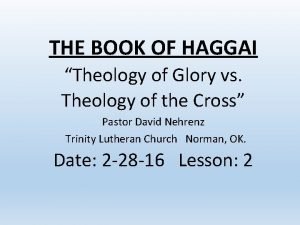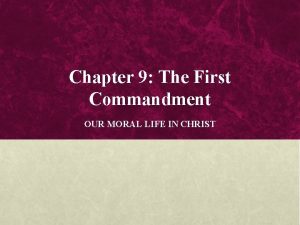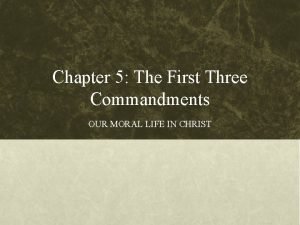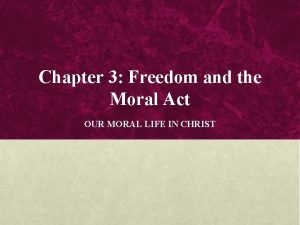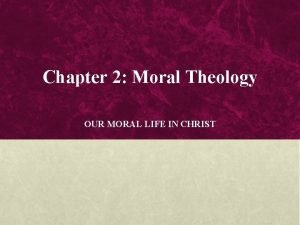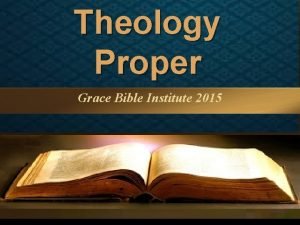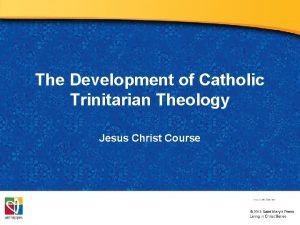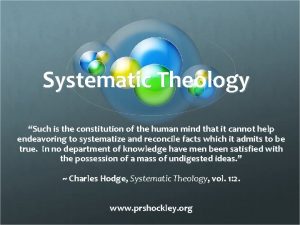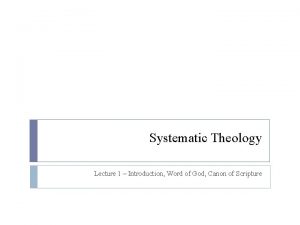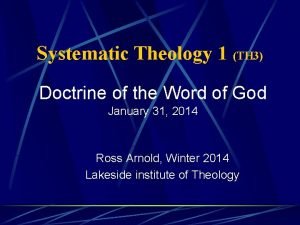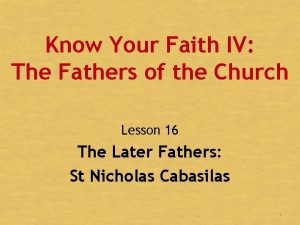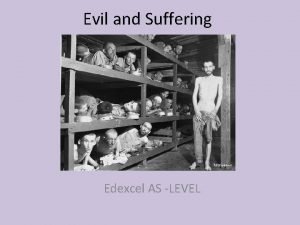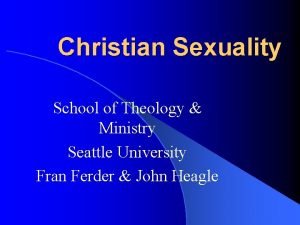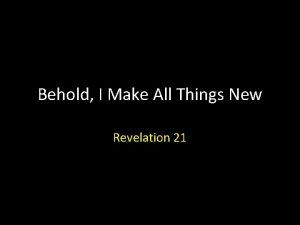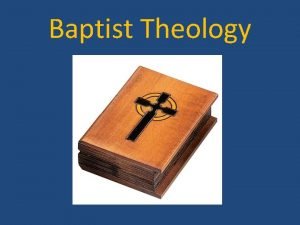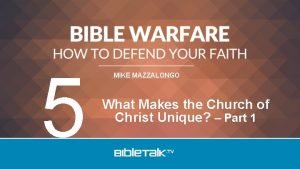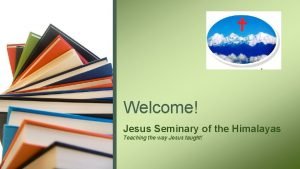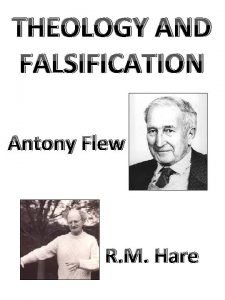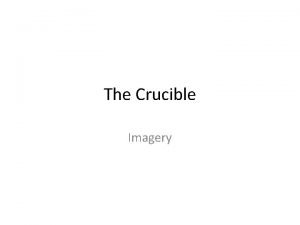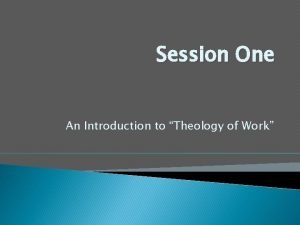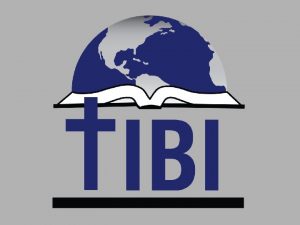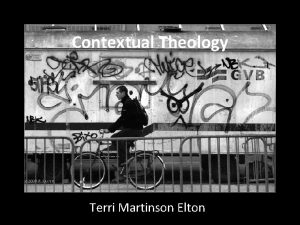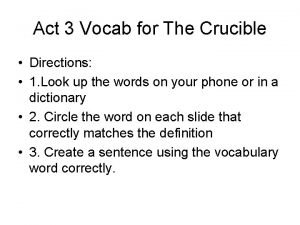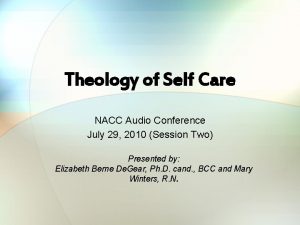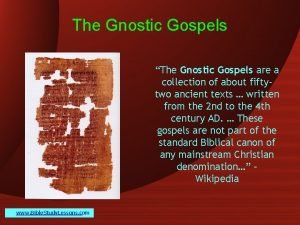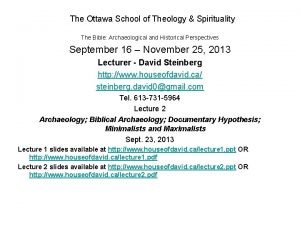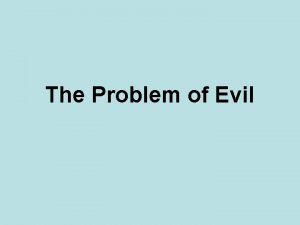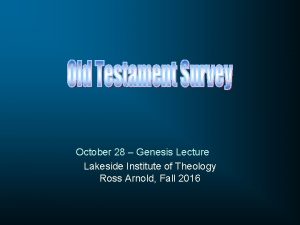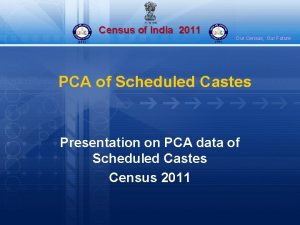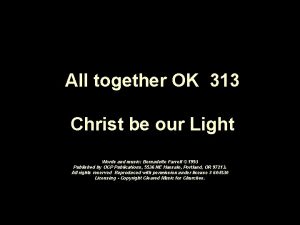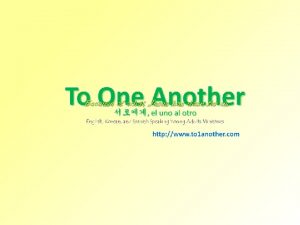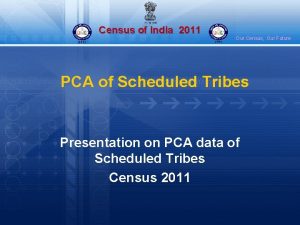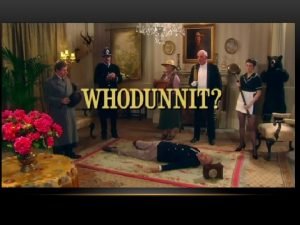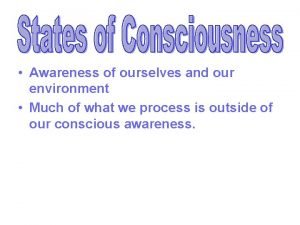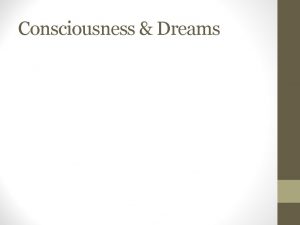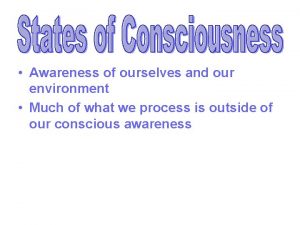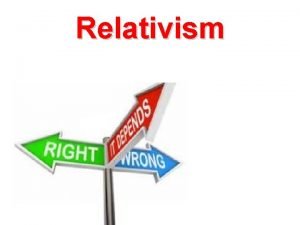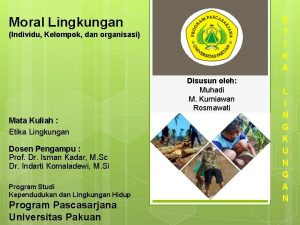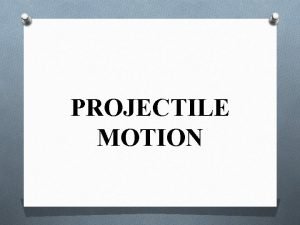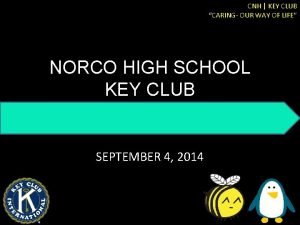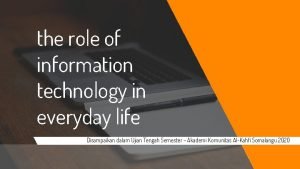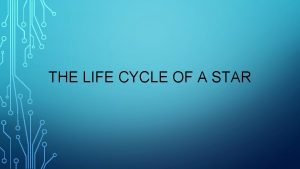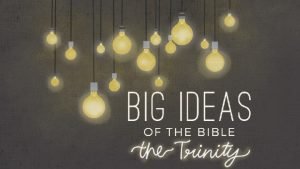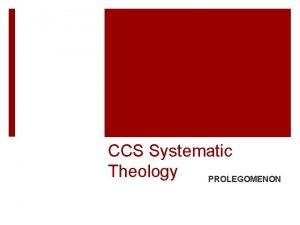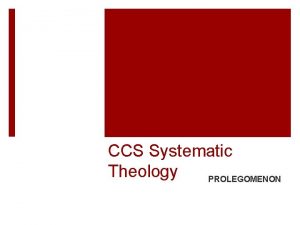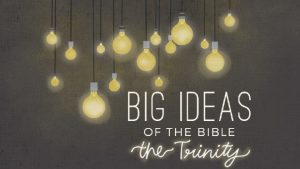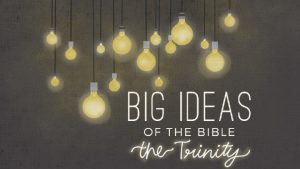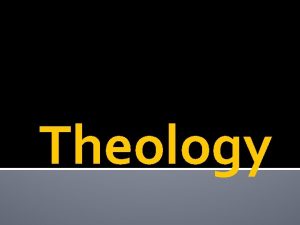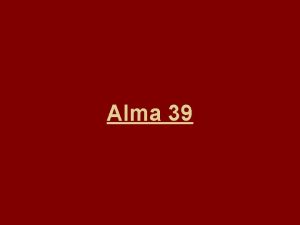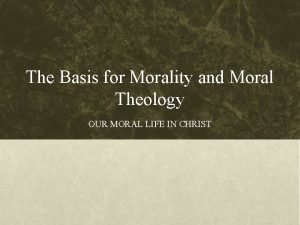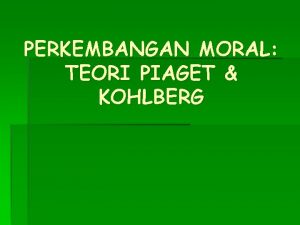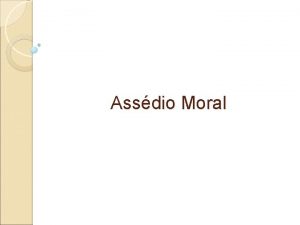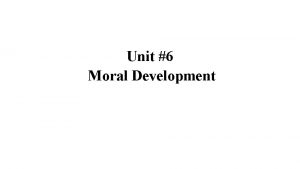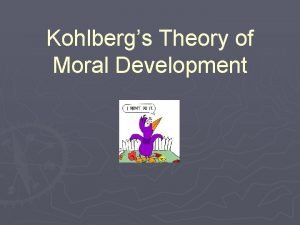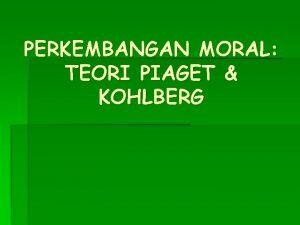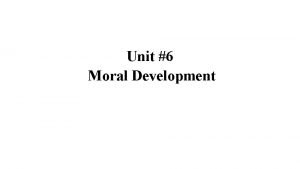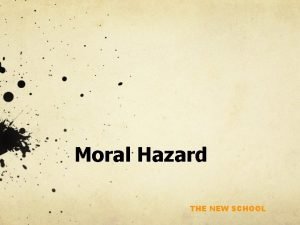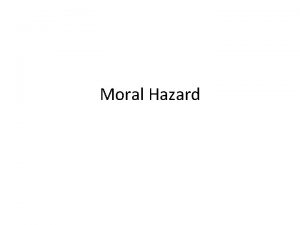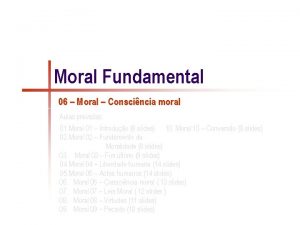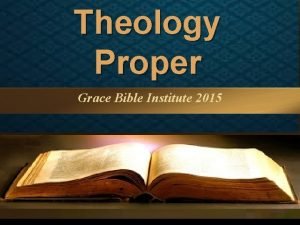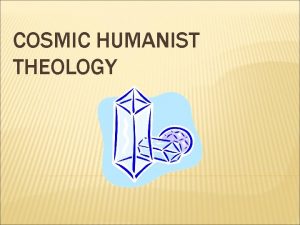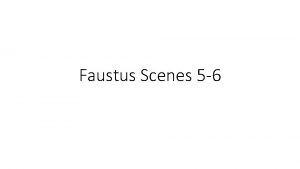Chapter 2 Moral Theology OUR MORAL LIFE IN

























































- Slides: 57

Chapter 2: Moral Theology OUR MORAL LIFE IN CHRIST

1. What is Moral Theology? (pp. 31– 34) ANTICIPATORY SET Read the selections from Genesis that begins this chapter. Conduct a class discussion on the following question: What passages in Genesis 1– 2 indicate that man has dignity and that life is sacred?

1. What is Moral Theology? (pp. 31– 34) BASIC QUESTIONS Why is human life sacred? What is moral theology? What is the relationship between moral theology and reason? KEY IDEAS Human life has dignity and is sacred because we are God’s creation made in his own image. Moral theology is the study of the principles and actions that will lead the human person to a life of holiness and to eternal salvation. It is based on Divine Revelation and taught by the Catholic Church. Moral theology is in accord with human reason and science. Disregarding it leads to disastrous consequences for individuals and societies.

1. What is Moral Theology? (pp. 31– 34) GUIDED EXERCISE Conduct a think/pair/share on the following question: What does it mean to say moral theology “is concerned with the good and the evil of human actions and of the individual person who performs these actions”?

1. What is Moral Theology? (pp. 31– 34) FOCUS QUESTIONS How is “moral theology” accessible to all people by its very nature? It is accessible because it is in accord with human reason and is compatible with natural science. How is God the origin and end of all good moral actions? The origin of moral theology is Divine Revelation. The end of moral theology is attaining God in Heaven through a life of holiness on earth. What is the purpose of moral theology? The purpose of moral theology is to lead the human person to a life of holiness and to eternal salvation with God in Heaven.

1. What is Moral Theology? (pp. 31– 34) FOCUS QUESTIONS How can Catholics have assurance that the moral teachings of the Church are correct? God guarantees that the teachings of the Church are correct. The Church’s moral teachings are revealed through Sacred Scripture and Sacred Tradition and communicated through the Magisterium. What often happens to societies that reject the moral law revealed by God? They reach erroneous conclusions and end up creating cultures of death, hatred, and falsehood. Nazi Germany and Soviet Communism are two notable examples from the twentieth century.

1. What is Moral Theology? (pp. 31– 34) CLOSURE Have the students write a paragraph building a case for the sacredness of life from the Book of Genesis.

1. What is Moral Theology? (pp. 31– 34) HOMEWORK ASSIGNMENT Study Questions 1– 5 (p. 50) Workbook Questions 1– 2 Read “The Christian Concept of Mankind” (pp. 34– 37)

1. What is Moral Theology? (pp. 31– 34) ALTERNATIVE ASSESSMENT Free write for five minutes on what your life and our society would be like if the Fourth Commandment were completely rejected by all people. Share responses.

2. The Christian Concept of Mankind (pp. 34– 37) ANTICIPATORY SET Have the students imagine they are part of an organized crime gang. Have them individually write for a few moments to come up with a theory explaining why organized crime is a good thing. Share some responses. Then explain that in this lesson they will be seeing some false models of human behavior that claim to have reason on their side.

2. The Christian Concept of Mankind (pp. 34– 37) BASIC QUESTIONS What makes us human? What is Christian humanism? How is the soul created? With what aspect of the person is moral theology concerned? KEY IDEAS Our immortal souls make us human, separating us from animals, which cannot know God or consciously and freely love. Christian humanism emphasizes the dignity of the human person made in the image of God. The soul is directly created by God. Moral theology involves both the physical and spiritual realities of the human person.

2. The Christian Concept of Mankind (pp. 34– 37) FOCUS QUESTIONS What is the difference between humans and animals regarding moral actions? We have immortal souls that give us the ability to know and love God and our neighbor. Animals do not have souls. They, therefore, do not have to know and love God and cannot perform moral actions. What is secular humanism? Secular humanism is a materialistic view that exalts humanity but leaves God out of the picture. Why can human reason on its own not determine moral truths without error? Human reason can discover moral truths on its own, but it is prone to error. If the existence of God is denied, then many people will erroneously be

2. The Christian Concept of Mankind (pp. 34– 37) FOCUS QUESTIONS What is a “materialistic view” of the world? It is one that recognizes only the existence of physical matter and ignores or rejects the immaterial or supernatural. Why will “scientism” always fail to answer the basic problems of mankind? Scientism is a philosophy in which the only truths that exist are those that can be scientifically demonstrated. Science can discover how the world works and, through technology, it can give us new powers over the natural world. Science, however, cannot tell us what to do with the knowledge and power we gain. Thus, scientism cannot offer a reason why we should not use knowledge and power in selfish and evil ways.

2. The Christian Concept of Mankind (pp. 34– 37) GUIDED EXERCISE Have the students free write for a few minutes on what is false about the claim that if something cannot be directly experienced, measured, or observed, then it cannot be known with certainty. Call on students to share responses.

2. The Christian Concept of Mankind (pp. 34– 37) FOCUS QUESTIONS What is the error of a “purely spiritual” viewpoint? Excessive spiritualism denies the inherent goodness of matter and thus of the human body. The Christian view is that our moral actions are acts of both body and soul and that creation is good. What is Christian humanism? It is the view that God has created us with an inherent dignity and given us marvelous gifts that reflect his own wisdom and goodness.

2. The Christian Concept of Mankind (pp. 34– 37) FOCUS QUESTIONS What is a soul? The human soul is the spiritual part of a person, which has the power to think and will. The soul is immortal, i. e. , it survives beyond the death of the body. What are some characteristics that differentiate humans from the rest of creation? Humans search for truth and are morally responsible for their actions. Humans can also fashion things that express and evaluate the human spirit, e. g. , art, music, science, literature, film, and humor.

2. The Christian Concept of Mankind (pp. 34– 37) GUIDED EXERCISE Have the students work with a partner to come up with another example of why sociobiology can err. Briefly share examples.

2. The Christian Concept of Mankind (pp. 34– 37) GUIDED EXERCISE Have the students write for a few minutes on the implications of an ancient belief that the soul, which was considered good, was imprisoned in the body, which was considered bad.

2. The Christian Concept of Mankind (pp. 34– 37) FOCUS QUESTIONS What is the function of the soul in the human person? The soul gives the body the capacity for spiritual operations such as knowledge, acts of faith and love, and supernatural life. What is the ultimate end of the soul? The soul does not have a temporal end because it is immortal. Death is the separation of the body, which decomposes, from the soul, which continues to exist.

2. The Christian Concept of Mankind (pp. 34– 37) FOCUS QUESTIONS What is a human body? The body is an incredibly sophisticated biological form that is enlivened by an immortal and rational soul. Why does a human person have dignity? The person’s soul is created directly by God at the moment of conception and we are made in his image and dignity. How did Christ affirm the relationship of body and soul in instituting the Sacraments? By bestowing spiritual grace through physical signs, Christ united the spiritual and the material in the Sacraments.

2. The Christian Concept of Mankind (pp. 34– 37) CLOSURE Have students present a concise argument for why sociobiology and secular humanism are defective bases for morality.

2. The Christian Concept of Mankind (pp. 34– 37) HOMEWORK ASSIGNMENT Study Questions 6– 20 (p. 50) Workbook Questions 3– 10 Read “Moral Expectations of Christians” through “Moral Requirements for Man as a Social Being” (pp. 37– 39)

2. The Christian Concept of Mankind (pp. 34– 37) ALTERNATIVE ASSESSMENT Have the students free write for five minutes on the following question: What is wrong with the idea that if a certain percentage of the population does something, then that behavior should be permitted?

3. Moral Expectations of Christians (pp. 37– 39) ANTICIPATORY SET Incorporate Matthew 5: 38– 42 (“an eye for an eye” and “turn the other cheek”) into the class’s opening prayer. Then discuss the following questions: Which of these sayings do you find attractive? What seems difficult or even impossible to practice? When and how should evil be resisted?

3. Moral Expectations of Christians (pp. 37– 39) BASIC QUESTIONS Do Christians have a greater moral responsibility than non‑Christians? To what standard of behavior is a Christian called? Why does the human person have social obligations? KEY IDEAS Due to their Baptism, Christians have a greater moral responsibility in God’s eyes. Christians are called to treat others with a supernatural, unconditional love. Man is a social being. Because of this, Christian morality involves both personal and social obligations.

3. Moral Expectations of Christians (pp. 37– 39) GUIDED EXERCISE Have the students work with a partner to complete Practical Exercise 2, identifying some of the higher standards that a follower of Christ is called to live.

3. Moral Expectations of Christians (pp. 37– 39) GUIDED EXERCISE Have the students brainstorm ideas to complete Practical Exercise 3 on concrete things teens can do to increase God’s presence in their souls.

3. Moral Expectations of Christians (pp. 37– 39) FOCUS QUESTIONS Why is a Christian held to a higher standard of conduct? Through Baptism, a Christian becomes a child of God and part of the Mystical Body of Christ, the Church. Where can these higher standards revealed by Christ be found? They are found in the Beatitudes, the Sermon on the Mount, and in the New Commandment of Love. What is the “moral” taught by Christ in the Parable of the Good Samaritan? We are to love even the unlovable.

3. Moral Expectations of Christians (pp. 37– 39) FOCUS QUESTIONS How did Christ perfect the Commandments in Matthew 5: 18– 48? Christ taught that it was not sufficient for Christians just to avoid murder, but they should not even give in to anger. Likewise, it was not sufficient just to avoid adultery, but a man should not even look at a woman with lust. In a like manner, Christ perfected the Commandments of the Old Law. How can a person merit an increase of grace (the divine life of God) in the soul? By freely cooperating with grace, a person can merit more grace.

3. Moral Expectations of Christians (pp. 37– 39) GUIDED EXERCISE Have the students visit the following Web site to get an overview of the seven “themes” of Catholic social teaching: www. usccb. org/sdwp/projects/socialteaching/excerpt. shtml

3. Moral Expectations of Christians (pp. 37– 39) GUIDED EXERCISE Write a paragraph summarizing why man has individual and social moral obligations.

3. Moral Expectations of Christians (pp. 37– 39) GUIDED EXERCISE Have the students work in groups of three or four to develop a moral argument against lying based on the principle that man is a social being.

3. Moral Expectations of Christians (pp. 37– 39) FOCUS QUESTIONS What does it mean to say man is a social being? It means man is made to live with others and relate to them. How do Baptism and the Eucharist have both individual and communal characteristics? Baptism takes away Original Sin and actual sins and makes the recipient a child of God. The Eucharist nourishes the one who receives it with the very life of Christ. At the same time, Baptism makes one a member of the Church, and the Eucharist unites all the members of the Church. Why is the “social teaching” of the Church important? It is important because every person has social obligations, and people have the tendency to let their individual interests overshadow their social duties.

3. Moral Expectations of Christians (pp. 37– 39) GUIDED EXERCISE Lead a class discussion to help the students see how important it is to live as a social being, ask the students to consider the following questions: What would happen to a baby if left completely on his or her own? In our society, how old does a person have to be before he or she can care for him or herself completely? What would happen to a baby, if he or she was materially cared for, but not picked up, hugged, or spoken to? To what extent does even the richest and most powerful person in the world depend on other people?

3. Moral Expectations of Christians (pp. 37– 39) CLOSURE Have the students write a paragraph explaining to a non‑Christian what Christ’s New Commandment of love entails.

3. Moral Expectations of Christians (pp. 37– 39) HOMEWORK ASSIGNMENT Study Questions 21– 28 (p. 50) Practical Exercises 2– 4 (p. 29) Workbook Questions 11– 12 Read “Our Sources of Moral Theology” (through “The Magisterium”) (pp. 40– 43)

3. Moral Expectations of Christians (pp. 37– 39) ALTERNATIVE ASSESSMENT Have the students free write about circumstances in which it would be right to turn the other cheek and circumstances in which it would not be right.

4. Our Sources of Moral Theology (part one) (pp. 40– 43) ANTICIPATORY SET Have the students read the first two paragraphs of “Our Sources of Moral Theology” (p. 40) and write a one‑sentence statement of how history is studied and a one‑sentence statement of how the applied sciences are interrelated.

4. Our Sources of Moral Theology (part one) (pp. 40– 43) BASIC QUESTIONS What are the sources of moral theology? What is the place of the life and teachings of Christ in moral theology? What is the role of Sacred Tradition in moral theology? KEY IDEAS The principles of moral theology are drawn from the Deposit of Faith— Sacred Scriptures and Sacred Tradition—and interpreted and taught by the Magisterium of the Church. The preeminent source of moral theology is the life and teachings of Christ. Sacred Tradition transmits the entire Word of God to the successors of the Apostles so they may preserve, expound, and spread the Gospel.

4. Our Sources of Moral Theology (part one) (pp. 40– 43) FOCUS QUESTIONS How might the sciences be useful in aiding moral theology in finding the truth? Philosophical ethics analyzes and explains good human behavior. Rational psychology explains how people form ideas and make choices. Anthropology, biology, and medicine can also corroborate and support the moral teachings of the Church.

4. Our Sources of Moral Theology (part one) (pp. 40– 43) FOCUS QUESTIONS From what sources does moral theology draw its principles? Moral theology draws its principles from the Deposit of Faith, which consists of Sacred Scripture and Sacred Tradition. What is the ongoing work of Catholic moral theology? The Church applies the moral truths revealed by God to specific situations that need moral evaluation or clarification. Extension: For example, in the early 1960 s the oral contraceptive pill was sold to the public for the first time. Some Catholics were unclear whether the use of this contraceptive product was moral or immoral. In 1968, Pope Paul VI issued Humanae Vitae, which, in dealing with the entire question of the transmission of human life, answered that all contraception is wrong.

4. Our Sources of Moral Theology (part one) (pp. 40– 43) FOCUS QUESTIONS How can one be sure that the Bible is without error? God inspired the sacred writers to record what he wanted them to record so that every person could find salvation. From what source is Christian morality especially drawn? The teachings of Christ as found in the New Testament. What are the principal sources of Christian morality in the New Testament? The Gospels are the principal sources. What are the two principal sources for Christian morality in the Gospels?

4. Our Sources of Moral Theology (part one) (pp. 40– 43) FOCUS QUESTIONS Are all the precepts in the Bible meant to be binding forever? Explain. Give an example. Not all biblical precepts were meant to be binding forever. For example, Moses permitted divorce, but Christ restored marriage to its original meaning. What does tradition mean? It means “to pass on. ” What is Sacred Tradition? Sacred Tradition transmits the entire Word of God to the successors of the Apostles so they may preserve, expound, and spread it. Where are the contents of Sacred Tradition found? Sacred Tradition can especially be found in the record of liturgical practice, in personal piety, and in interpretations and clarifications of the apostolic teachings that the early Church Fathers left us.

4. Our Sources of Moral Theology (part one) (pp. 40– 43) GUIDED EXERCISE Have the students work with a partner to formulate responses to the following questions about tradition: How would you explain the difference between Sacred Tradition, from which moral theology is derived, and traditions, such as priests wearing a white collar, which can be changed? How might a Catholic have difficulties if he or she does not adequately understand the difference?

4. Our Sources of Moral Theology (part one) (pp. 40– 43) FOCUS QUESTIONS What is the Magisterium? Magisterium comes from the Latin magister, which means teacher. The Magisterium is the doctrinal and moral teaching authority of the Pope and the bishops united to him. The Magisterium interprets and teaches from the Deposit of Faith. Why cannot Catholics just read the Bible and figure out doctrines for themselves? Christ founded a Church and entrusted it to St. Peter and the Apostles and their successors, the Pope and bishops united to him. The authentic interpretation of the Scriptures is entrusted to the Magisterium alone.

4. Our Sources of Moral Theology (part one) (pp. 40– 43) CLOSURE Have the students write a concise statement of the relationship among Scripture, Tradition, and the Magisterium in moral theology.

4. Our Sources of Moral Theology (part one) (pp. 40– 43) HOMEWORK ASSIGNMENT Study Questions 29– 32 (p. 50) Practical Exercises 8– 9 (p. 51) Workbook Questions 13– 14 Read (finish) “Our Sources of Moral Theology” through “Conclusion” (pp. 43– 44)

4. Our Sources of Moral Theology (part one) (pp. 40– 43) ALTERNATIVE ASSESSMENT Have a student read aloud the Catechism, no. 889– 891, and then lead a class discussion on the infallibility of the Magisterium of the Church.

5. Our Sources of Moral Theology (part two) and Conclusion (pp. 43– 44) ANTICIPATORY SET Have the students work with a partner to summarize the ideas in the selection from Dignitatis Humanae (Supplementary Reading 2). See Supplementary Reading for an analysis of the passage. Then ask the students to free write for two minutes on the following questions and briefly discuss responses: Why do we have an obligation to seek and live by the truth?

5. Our Sources of Moral Theology (part two) and Conclusion (pp. 43– 44) BASIC QUESTIONS What is the Magisterium? What is the relationship between the sciences and Catholic moral law? Why should Catholics have confidence in the truth of Catholic moral teachings? KEY IDEAS The Magisterium is the doctrinal and moral teaching authority of the Pope and the bishops united to him. The sciences can supplement Catholic moral teaching in important ways but can never replace it. Believers should be confident in the objective truth of Catholic moral teachings.

5. Our Sources of Moral Theology (part two) and Conclusion (pp. 43– 44) FOCUS QUESTIONS Why can the natural sciences never replace moral theology as a source of truth? Science is based on reason. Revelation goes beyond human reason alone. Human sciences cannot substitute for or diminish the authority of Scripture, Tradition, and the Magisterium. Why is it a responsibility of Catholics to have a good understanding of the Catholic Faith? There are many reasons. Because the Holy Spirit guides the Church in developing and safeguarding her teachings, believers enjoy a certainty that they possess objective moral truth without the possibility of error. This truth should then guide their lives and be a help to those around them who need moral guidance.

5. Our Sources of Moral Theology (part two) and Conclusion (pp. 43– 44) GUIDED EXERCISE Have the students work with a partner to complete Practical Exercise 5 on differences between philosophical ethics and Christian moral theology.

5. Our Sources of Moral Theology (part two) and Conclusion (pp. 43– 44) GUIDED EXERCISE Have the students work with a partner to complete Practical Exercise 7 to compare the ideas of Cicero and Aristotle in Supplementary Readings 1 and 3.

5. Our Sources of Moral Theology (part two) and Conclusion (pp. 43– 44) CLOSURE Have the students free write for five minutes on some topic that they found important or confusing in this lesson.

5. Our Sources of Moral Theology (part two) and Conclusion (pp. 43– 44) HOMEWORK ASSIGNMENT Study Questions 33– 36 (p. 50) Practical Exercises 5– 7, 10 (p. 51) Workbook Questions 15– 21 Read “Catholic Morality and Civil Ethics in Modern Society” through “The “New Morality’” (pp. 46– 47)

5. Our Sources of Moral Theology (part two) and Conclusion (pp. 43– 44) ALTERNATIVE ASSESSMENT Conduct a class discussion on the following question: Based on the Supplementary Readings, what would Aristotle and Cicero say to the contention that there is not a universal, binding moral law based on human nature that all humans should follow? (see p. 45)

The End
 Theology of glory vs theology of the cross
Theology of glory vs theology of the cross Our moral life in christ chapter 9 study questions
Our moral life in christ chapter 9 study questions Our moral life in christ chapter 5 study questions
Our moral life in christ chapter 5 study questions Moral act
Moral act Our moral life in christ chapter 1 questions and answers
Our moral life in christ chapter 1 questions and answers Marcus aurelius our life is what our thoughts make it
Marcus aurelius our life is what our thoughts make it Our life is what our thoughts make it
Our life is what our thoughts make it Define theology proper
Define theology proper Proper_grace
Proper_grace Antony flew theology and falsification
Antony flew theology and falsification The development of catholic trinitarian theology
The development of catholic trinitarian theology Elenctic theology definition
Elenctic theology definition Theology proper lecture notes
Theology proper lecture notes What is theology
What is theology Palamite theology
Palamite theology David hume inconsistent triad
David hume inconsistent triad Seattle university school of theology and ministry
Seattle university school of theology and ministry Jon courson theology
Jon courson theology Eccumenicalism
Eccumenicalism Arminian theology
Arminian theology Mike mazzalongo church
Mike mazzalongo church 5 pillars of reformed theology
5 pillars of reformed theology Jesus seminary
Jesus seminary Antony flew theology and falsification
Antony flew theology and falsification Theology sir is a fortress meaning
Theology sir is a fortress meaning Theology
Theology Practical theology mpt
Practical theology mpt Praxis model of contextual theology
Praxis model of contextual theology The crucible vocab act 3
The crucible vocab act 3 Theology of self care
Theology of self care David e. pratte wikipedia
David e. pratte wikipedia Ottawa school of theology and spirituality
Ottawa school of theology and spirituality New creation theology
New creation theology Theology of missions
Theology of missions Inconsistent triad
Inconsistent triad Lakeside institute of theology
Lakeside institute of theology Mono theology
Mono theology Thinking affects our language which then affects our
Thinking affects our language which then affects our Our census our future
Our census our future Christ, be our light
Christ, be our light We bow our hearts we bend our knees
We bow our hearts we bend our knees Our census our future
Our census our future Money madness is written by
Money madness is written by Our awareness of ourselves and our environment
Our awareness of ourselves and our environment Awareness of ourselves and our environment is:
Awareness of ourselves and our environment is: God our father christ our brother
God our father christ our brother Our future is in our hands quotes
Our future is in our hands quotes Awareness of ourselves and our environment is
Awareness of ourselves and our environment is Awareness of ourselves and our environment
Awareness of ourselves and our environment What happens if we leave afghanistan
What happens if we leave afghanistan Moral kelompok adalah
Moral kelompok adalah Moral de esclavos y moral de señores
Moral de esclavos y moral de señores Moral realism
Moral realism Example of projectile motion
Example of projectile motion Cnh key club
Cnh key club Role of information technology in our daily life
Role of information technology in our daily life Beetlejuice planet size
Beetlejuice planet size Sport in our life
Sport in our life
